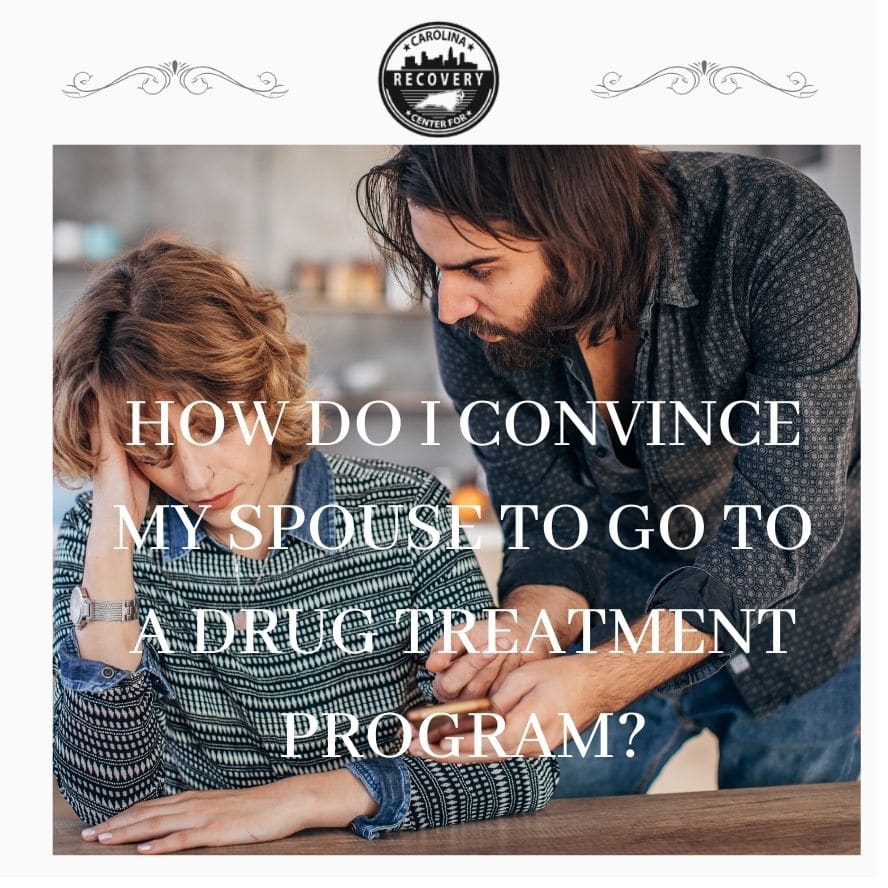How Do I Convince My Spouse To Go To a Drug Treatment Program In North Carolina?

Medically Verified: 2/1/24
Medical Reviewer
Chief Editor

All of the information on this page has been reviewed and verified by a certified addiction professional.
Substance abuse takes hold of people’s lives quickly, often causing them to behave uncharacteristically. Unfortunately, this tends to cause turmoil and tension in a marriage, drastically shifting dynamics seemingly overnight.[1] If your spouse is struggling with the disease of addiction, you may find that your relationship has changed for the worse. The first step in healing your marriage is being honest with yourself about the reality of your and your spouse’s situation.
During the beginning stages of your spouse’s addiction, you may find yourself in denial. For example, it is common to refuse to see the signs of addiction and accept your partner’s excuses too easily. This may be a source of guilt or shame, as you feel like you could have stepped in earlier to prevent your spouse’s problem from progressing. Additionally, you might feel like you enabled your addicted spouse without meaning to by providing them with extra money or a means to obtain drugs or alcohol.[2]
However, you need to acknowledge and come to terms with whatever mistake you may have made in terms of your significant other’s substance abuse. Forgiving yourself and moving on with a fresh perspective is vital for your partner’s success. This will allow you to become unburdened by the past and able to make decisions from a place of love and strength.
Despite how hopeless you may feel, there are ways to convince your addicted spouse to go to a drug treatment program in North Carolina.
Convincing a Spouse to Attend Addiction Treatment
There are many ways to try to convince your husband or wife to attend addiction treatment. However, it is important to note that their decision to attend treatment is entirely on them. You can take steps to help them realize that they require professional treatment, but there is no guarantee that they will be ready to accept help.
Write a Letter
If you have a hard time keeping your emotions in check during serious conversations, it would be helpful to write a letter. Writing things out can help you to keep your tone loving and caring, rather than accusatory. To explain, you should avoid listing the faults and failures of your partner and remind them of the positive traits that their addiction has clouded. You should clearly explain how their addiction has affected you and other family members or friends without being argumentative. Lastly, lay down some boundaries explaining what would happen if your spouse decides not to attend addiction treatment.
Attend Therapy
Couples therapy is beneficial for several reasons. Because addiction affects both partners, being in therapy will help both of you to heal from the issues that your addicted spouse has caused. Additionally, a therapist is trained to outline patterns of behavior to show the cause of an individual’s problems. This will help your spouse to see how their addiction has impacted both of your lives and hopefully motivate them to attend a drug addiction treatment program in North Carolina.
Talk to Friends and Loved Ones
If your friends and loved ones are not aware of your partner’s addiction, it may be time to open up to them. By telling your loved ones, you may be more motivated to make a change as you know you aren’t alone in trying to save your husband’s or wife’s life. Additionally, it is important to have support from your friends and family members during this time, as dealing with a spouse’s addiction can be mentally and emotionally draining.
Stage an Intervention
Interventions are small groups of friends and family that gather to convince someone with a substance abuse issue to attend treatment. Usually, interventions are planned and led by professional interventionists to ensure the conversations remain productive. Participants of the intervention will express their concerns one by one clearly and compassionately. Before the intervention takes place, plans for your spouse to attend treatment should be set up so they can attend immediately, decreasing the chance of your spouse changing their mind about attending treatment.
What to do When Your Addicted Spouse Refuses to Attend Treatment
Unfortunately, convincing your spouse to go to a drug treatment program is not always successful. Sometimes they are in denial about the severity of their substance abuse, or they are simply not ready to commit to being sober. If your partner refuses to go to treatment, there are a couple of options to consider.
Involuntary commitment is never an ideal choice, but if your spouse has a life-threatening substance use disorder it may be necessary. To explain, involuntary commitment involves having clear evidence to provide to the courts that your spouse is a danger to themselves or others and must be taken to addiction treatment against their will.[3] Speak to a legal professional in North Carolina to learn more about when involuntary commitment is appropriate.
Lastly, if your spouse refuses to attend treatment it is important for you to set boundaries. When one spouse is addicted to drugs and refuses help, many people set the boundary of divorce or separation. You get to make and set your own boundaries based on your personal situation, just make sure to communicate your boundaries clearly and stick to them.
Find Help for a Drug-Addicted Spouse Today
If your spouse is in need of drug addiction treatment in North Carolina, contact Carolina Recovery Center today. We can help your husband or wife recover from the disease of addiction. Call now to get started.
References:

